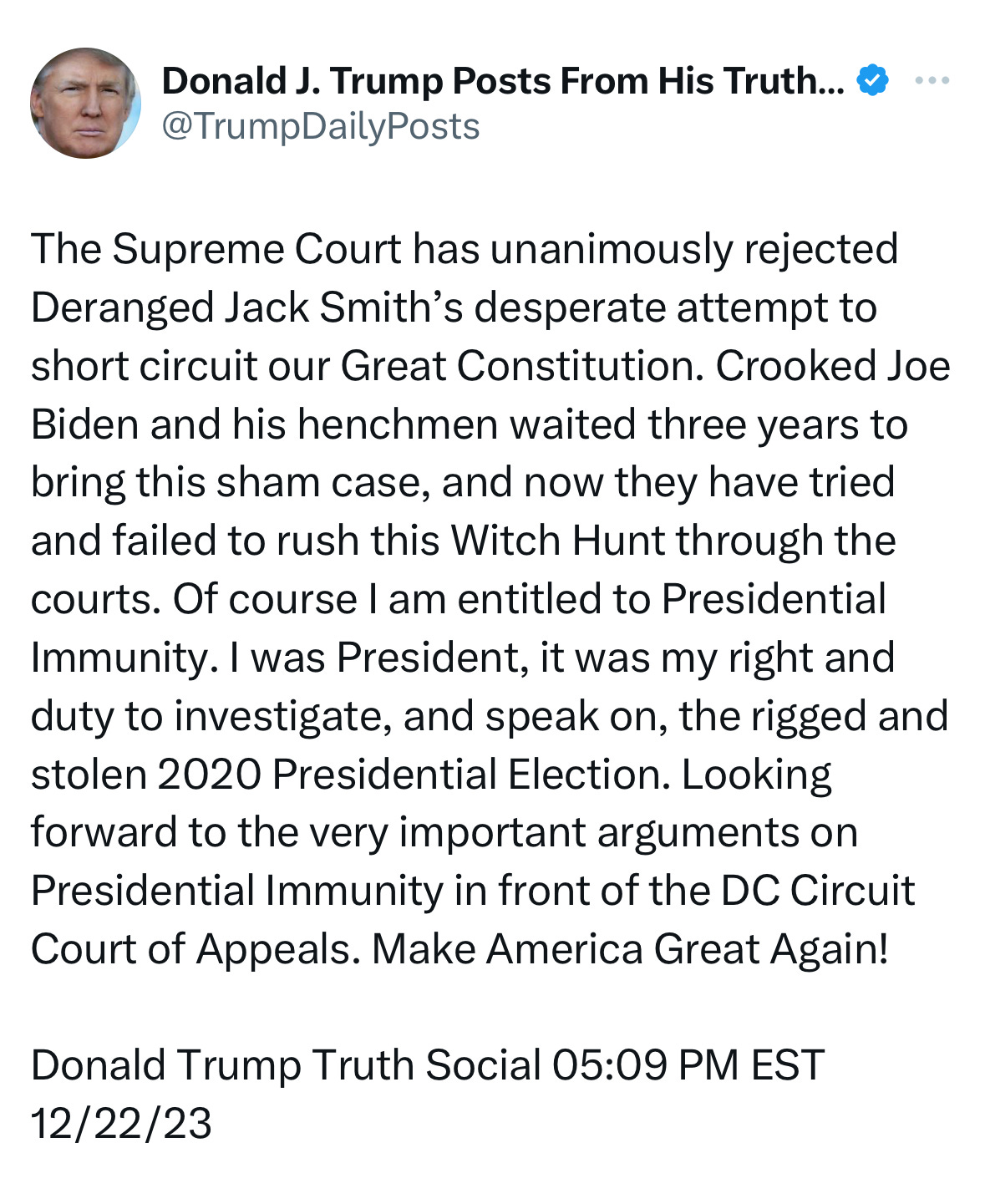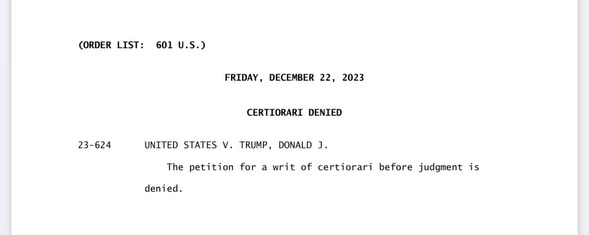Let's Debunk This
Tonight, I had planned to tell you the story of Pumpkin the chicken, winding some string around her foot, which led me to bring her inside for some attention, which turned into a bath, and then a little photo session that got photobombed by Tofu. But, of course, legal news happened, so all you get is this photo, and the story will have to wait. Suffice it to say, Pumpkin loves having her feathers blown dry and has been beside herself with happiness.
This afternoon, the Supreme Court declined Jack Smith’s request to hear Trump’s appeal on presidential immunity, bypassing the court of appeals. Trump’s immunity motion is important because if he wins, it’s game over. The entire indictment would get dismissed if he were immune from prosecution. And while my assessment is in line with Judge Chutkan’s—she denied Trump’s motion—we don’t know for certain what the Supreme Court will do.
Logically, Trump’s motion lacks merit.
To grant it, the Court would have to hold that presidents are above the law. All presidents, not just Trump. Anything they do while they’re president is protected. We’ve seen that same argument rejected repeatedly in a civil context: E. Jean Carroll’s case and the civil suit over January 6 in Washington, D.C., for instance. There’s no analytical reason to believe criminal conduct is any more deserving of protection than civil violations are, once a president is out of office.
Trump claims that even absent total immunity for presidential conduct, the conduct he’s been charged with falls within the “outer perimeter” of a president’s duties, so he’s entitled to immunity. To credit that, the courts would have to believe that the steps Trump took to interfere with multiple states’ votes, elections a president has no role in, are somehow a part of his job. Elections are run by secretaries of state and county officials. The president has no say in the final vote count and no duties, core or outer perimeter, to interfere in those counts or the final report of the Electoral College.
If the Supreme Court granted Trump’s motion, what would prevent Joe Biden or any future president from doing precisely what Trump did in 2020, but with more skill—and succeeding? Nothing. The Supreme Court would have ruled they could do no wrong. And that’s why the Supreme Court has to deny Trump’s motion to dismiss the charges, unless it wants to end democracy by giving a license to the next president to do whatever it takes to stay in power.
It didn’t take long for Trump to weigh in after the Supreme Court’s decision today. He got it badly wrong. Let’s count the ways and debunk the falsehoods.
First, Trump claims the Supreme Court has “unanimously rejected Deranged Jack Smith’s desperate attempt to short circuit our Great Constitution.” Leaving the persistent errors in capitalization to the side, Smith isn’t trying to “short circuit” the Constitution—he asked for an established writ that has been used in other cases of similar magnitude to send an appeal directly to the Supreme Court. Nor has the Court unanimously rejected the underlying issue, Judge Chutkan’s denial of Trump presidential immunity motion. That substantive issue is still to be decided.
Trump then claims, “Crooked Joe Biden and his henchmen waited three years to bring this sham case.” How can such a short sentence be wrong in so many ways? There is nothing—no evidence, and four years where Trump controlled the Justice Department and presumably would have found any if it existed, to support the assertion Joe Biden is “crooked.” Nor does DOJ function as “henchmen” for President Biden. Perhaps that is what Trump would like his relationship with the Department to look like, but Jack Smith is independent and doesn’t take orders from Merrick Garland, let alone the President. And as for “waiting” three years to indict, to the contrary, from what we know, while there may have been some initial reluctance to investigate, by at least 2022, investigation was underway and the case, a very complicated one with lots of moving parts, was indicted on August 1, 2023. In other words, less than three years out from January 6, 2021.
It continues. Trump claims, “I was President, it was my right and duty to investigate, and speak on, the rigged and stolen 2020 Presidential election.” As we noted above, elections are run by states. They certify their results on the basis of the results in each county. So, Trump had no right to get involved in the vote count in Wayne County, Michigan, but we now know that he tried to cajole Republican vote canvassers there into refusing to certify the lawful vote. Just like he called Georgia’s Secretary of State and threatened he was committing a crime if he didn’t “find” Trump more votes. That’s not the president’s job. He had no more right than anyone else to interfere with state and county election officials’ tallies of their votes. If Trump suspected fraud he could report that to DOJ, which he of course did, and they told him in no uncertain terms they couldn’t find any evidence of it. So no, the election wasn’t rigged or stolen. And Trump had neither right nor duty to investigate. It’s just more red meat he throws at his base, hoping they won’t notice that it’s spoiled.
But at end, there’s something we can agree on. Trump says he’s “looking forward to the very important arguments on Presidential Immunity in front of the DC Circuit Court of Appeals.” So am I. But I expect him to lose, and then how long will it be before we hear from him about the corrupt Democrat judges on that court who are part of the witch hunt against him?
When we got its decision today, the Supreme Court did not explain why it denied Smith’s request to hear the appeal now. All we got was one sentence.
So, what does this do to Judge Chutkan’s scheduled March trial date? It probably blows it up. Although there’s a fantasy scenario that I’d like to cling to that could keep the case almost on track, it’s more likely that this spells delay, maybe significant delay. There are too many variables here for a reliable prediction about how long of one, but given that all proceedings before Judge Chutkan are stayed at least for now, delay seems inevitable.
First off, there is the timeline set by the rules of court to consider. As the Special Counsel noted in his reply brief, even if he were to win with a quick decision before the court of appeals, the default rules give Trump 45 days to seek en banc review before the full D.C. Circuit and 90 days to file for certiorari with the Supreme Court. That’s a good sized chunk of time. Although that schedule can be altered (either direction) by the courts, there’s the prospect for considerable delay.
The fantasy scenario where trial doesn’t get pushed back more than a month would have to look something like this:
The court of appeals moves quickly, deciding the appeal within a few days of oral argument.
The Supreme Court steps in immediately to hear the case—Jack Smith asked them to do this, but didn’t get a ruling in the one-liner above. It’s perhaps possible for the Court to decide to do this at a later date.
The Supreme Court moves quickly, with an expedited briefing schedule and a fast decision.
Voila, we only lose something like 60 days off the clock and trial starts in early May.
The fantasy scenario obviously depends on a lot of things going right, and it’s too early to have any sense about whether this is even a possibility. Although the court of appeals is on a fast track, we don’t know how long it will take them to issue a decision. Trump will presumably play out the time to ask for rehearing to the full extent possible. The court could, perhaps, decide a stay was no longer warranted and permit Judge Chutkan to restart her pretrial proceedings, which could incentivize Trump to move more quickly, but again, there are a lot of different considerations involved and no certainties. The most honest conclusion I can give you tonight is that we just don’t know for sure how the schedule will shape up.
One possible bright spot: There were no dissents from denial of certiorari in advance of judgment. If this decision had signaled some sort of move by a majority of the Court to prevent any of the Trump cases from going to trial before the election, we could have expected to see one or more of the liberal Justices dissent from the denial. The fact that none of them did may suggest that there isn’t dissatisfaction about the path forward and its likely speed. Or so we can hope.
More questions tonight than answers.
I plan to spend the next few days with friends and family, doing a lot of cooking and baking. I’ll jump back in if we get any additional developments, but plan to skip the usual Week Ahead edition on Sunday night. I promise that if Tofu manages to knock over the Christmas tree, you’ll get pictures! See you next week, ahead of the new year. Thanks for being a part of Civil Discourse!
We’re in this together,
Joyce






I must confess, I think I was on pins and needles waiting for your reliably lucid explanation for todays SCOTUS news. Having felt that way helped me realize that your level headed expositions of the currently almost daily legal upheavals in US life have become an important part of my daily life… literally helping me, and so many others “keep a grip.”
Thank you, Professor!
Dreaming on...the DC court of appeals decides the case quickly against Trump, he appeals, SCOTUS declines to hear it.
The scenario where a President can perform a criminal act with impunity is pretty ridiculous.